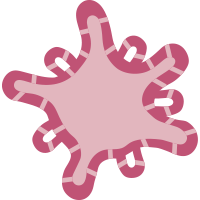
Organoid News
Organoid News is an online resource dedicated to the latest research about and featuring organoids.
Monkeypox Virus Spreads from Cell-to-Cell and Leads to Neuronal Death in Human Neural Organoids
[Nature Communications] Researchers analyzed the susceptibility of neural tissue to monkeypox virus using human neural organoids exposed to a clade IIb isolate. They reported susceptibility of several cell types to the virus, including neural progenitor cells and neurons.
Co-Development of Mesoderm and Endoderm Enables Organotypic Vascularization in Lung and Gut Organoids
[Cell] Scientists co-differentiated mesoderm and endoderm within the same spheroid to vascularize lung and intestinal organoids from iPSCs.
Jawbone-Like Organoids Generated from Human Pluripotent Stem Cells
[Nature Biomedical Engineering] Investigators presented a method for generating jawbone-like organoids from hiPSC through PA1 ectomesenchyme of the mandibular prominence.
Modeling Mesenchymal Stromal Cell Support to Hematopoiesis within a Novel 3D Artificial Marrow Organoid System
[Scientific Reports] The authors reported an original, fully-human in vitro 3D model of the bone marrow microenvironment dedicated to study interactions taking place between mesenchymal stromal cells and hematopoietic stem and progenitor cells during the hematopoietic differentiation.
Patient-Derived Cortical Organoids Reveal Senescence of Neural Progenitor Cells in Hutchinson-Gilford Progeria Syndrome
[Aging Cell] Scientists established cortical organoids derived from Hutchinson-Gilford progeria syndrome (HGPS) patient-iPSCs from patients with HGPS to investigate the role of progerin in the brain.
Early-Life Exposure to Polypropylene Nanoplastics Induces Neurodevelopmental Toxicity in Mice and Human iPSC-Derived Cerebral Organoids
[Journal of Nanobiotechnology] The authors investigated the impact of maternal exposure to polypropylene nanoplastics on fetal brain development and neurobehavioral outcomes in a mouse model and further explored its mechanism in human cerebral organoids.
Megan Orzalli Awarded Competitive Biomedical Science Research Grant
[UMass Chan Medical School] Megan Orzalli is one of eight recipients of the 2025 Investigators in the Pathogenesis of Infectious Disease award from the Burroughs Wellcome Fund.
Scalable Production of Human Cortical Organoids Using a Biocompatible Polymer
[Nature Biomedical Engineering] The authors developed a scalable cerebral cortical organoid platform by screening biocompatible polymers that prevent the fusion of organoids cultured in suspension.
Applications of Human Lung Organoids to Human Respiratory Virus Research: Advances, Limitations, and Future Directions
[Infection] Investigators compare common research models for human respiratory viruses (HRVs), outline the establishment of human lung organoids, and explore their applications in HRV studies.
Self-organization of sinusoidal vessels in pluripotent stem cell-derived human liver bud organoids
[Nature Biomedical Engineering] The authors directly differentiated hPSCs into CD32b+ putative liver sinusoidal progenitors by dictating developmental pathways.
Maturation of Human Cardiac Organoids Enables Complex Disease Modeling and Drug Discovery
[Nature Cardiovascular Research] Researchers mimicked human heart maturation pathways in the setting of hPSC-derived cardiac organoids.
Engrafted Nitrergic Neurons Derived from hPSCs Improve Gut Dysmotility in Mice
[Nature] Scientists introduced a platform based on hPSCs for therapeutic development targeting gastrointestinal motility disorders.
Organoids are three-dimensional cell cultures that more accurately model cell behavior, organ function, and pathology than traditional two-dimensional cell culture. Organoid News was launched in 2020 to help scientists stay up-to-date with this revolutionary new research system. Use Organoid News to stay current with the latest applications and discoveries using organoids, as well as new reviews, jobs, news, and upcoming events.

 Cancer Stem Cell News
Cancer Stem Cell News Cell Therapy News
Cell Therapy News Dermal Cell News
Dermal Cell News Endothelial Cell News
Endothelial Cell News ESC & iPSC News
ESC & iPSC News Extracellular Matrix News
Extracellular Matrix News Hematopoiesis News
Hematopoiesis News Hepatic Cell News
Hepatic Cell News Human Immunology News
Human Immunology News Immune Regulation News
Immune Regulation News
 Intestinal Cell News
Intestinal Cell News Mammary Cell News
Mammary Cell News Mesenchymal Cell News
Mesenchymal Cell News Muscle Cell News
Muscle Cell News Neural Cell News
Neural Cell News Organoid News
Organoid News Pancreatic Cell News
Pancreatic Cell News Prostate Cell News
Prostate Cell News Pulmonary Cell News
Pulmonary Cell News
